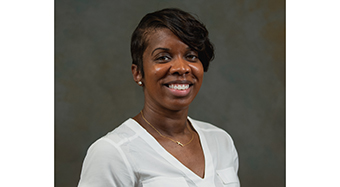CLEMSON — Atrocities committed against black Americans generations ago are having an impact today on their descendants’ decision to cast ballots in elections, according to research conducted by a Clemson University economic historian.

Jhacova Williams, an assistant professor in the John E. Walker Department of Economics, said her four-year research project has shown that black people who live in Southern counties where more lynchings occurred were less likely to register to vote, or were less likely to indicate that they voted in recent elections, compared to their white counterparts.
“The research examined voting in four presidential elections from 2000 to 2012 of 275 Southern counties in states where voters are identified by race,” the New Orleans native said. “The research shows that historical racial animus continues to influence the voting behavior of the black population in counties of the six Southern states that were the focus of the study.”
The College of Business researcher said the lynchings, estimated at more than 2,100 from 1882 to 1930, were illegal killings committed against black people and were social-control driven.
“The reasons for these lynchings were primarily about politically and economically controlling the behavior of black people, who in 1867 were given the right to vote in the South. The offenses which led to the lynchings ranged anywhere from rape to simply cursing at a white person. In one instance, a lynching occurred in Mississippi after a black person brushed up against a white person while rushing to board a train,” Williams said.
She said her interest in low voter participation stemmed from growing up in the South and having family and friends who didn’t vote.
“It was perplexing to me why people I knew well chose not to vote and they knew that economic and public policy are directly affected by elections. I always wondered why there was such a variance in voting participation in the South between black and white people.”
When asked why her research links today’s low voter turnout to lynchings and not other economic or social factors, she said her analysis took into account the possibility of alternative elements that may have influenced voter turnout.
[vid origin=”youtube” vid_id=”bgJe2bBO3iE” size=”medium” align=”left”]
“I accounted for other factors that may have had an effect on voting behaviors, such as education, earnings and incarceration rates of black people, to name a few,” she said. “Even after accounting for those factors, the relationship between lynchings and voting behaviors among the black population in these areas remained.”
Williams said she believes mistrust in the system, especially skepticism of those in elected positions, is at the crux of the problem.
“Public officials were often participants in the lynchings. What that tells people is these officials — many of them elected — and their communities won’t protect them,” she said. “If you were to ask someone today if they don’t vote because of atrocities of the past, they’ll say ‘no.’ But over time, a belief does exist that the elected officials don’t care about them.”
When asked how these perceptions could carry over from generations ago, Williams said families oftentimes pass those beliefs to the next generation by what members of those families see and hear growing up.
“If my great, great grandfather, for instance, mistrusted and maybe even feared public officials because of their involvement in these crimes or even ignored them, those attitudes can be passed down,” she said. “Children often grow up with these beliefs and many times they are reinforced from generation to generation. There are other forms of behavior children have witnessed over the years, such as Jim Crow laws and police brutality that reinforce the mistrust in public officials.”
Williams said the research confirms that segments of the population in these Southern counties are underrepresented at the polls. She said measures should be taken to improve black voters’ role in affecting American policy.
“It’s better for the country as a whole if everyone who is eligible to vote shows up at the polls. Efforts should be made to push people to vote in these counties through campaigns, perhaps by advocacy groups like the League of Women Voters or the NAACP.”
Get in touch and we will connect you with the author or another expert.
Or email us at news@clemson.edu

